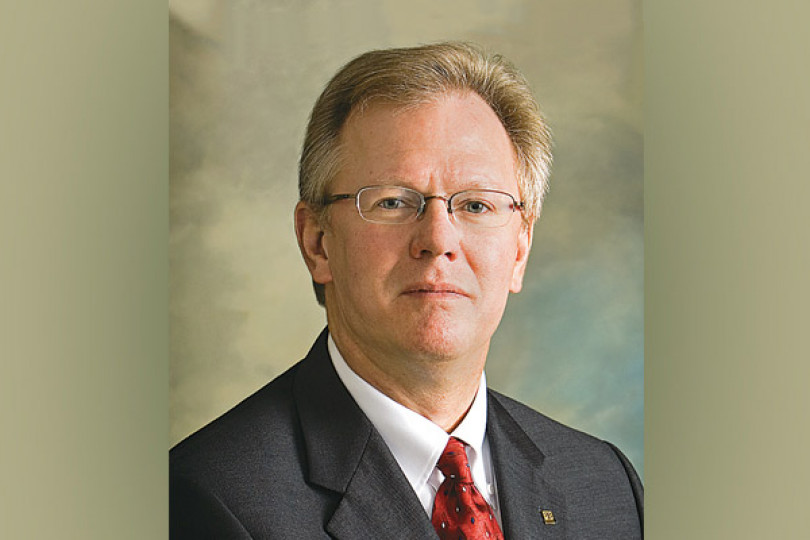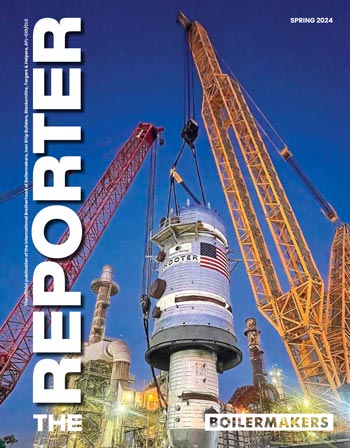Labor applauds middle class task force, new executive orders
CAMPAIGN PROMISES OFTEN wind up in the dust bins of history. However sincere those promises may be, the realities of office can quickly undo them.
That is why, when President Barack Obama took office January 20, many of us in the labor movement watched with equal parts optimism and reserve. Facing this president are an enormous financial crisis, two distant wars, unrest in the Mideast, and potential flashpoints in Iran and North Korea. Seldom in American history has an incoming president faced such an array of domestic and global challenges.
Yet, in his first three weeks in office, Pres. Obama has already begun to fulfill his promise to support unions. In words as well as deeds, he has demonstrated that labor and the middle class will be among his priorities — and that he views unions as “part of the solution” to our nation’s economic crisis.
President acknowledges union’s role in building middle class
ONE OF THE president’s first initiatives to address economic recovery was to establish a middle class task force chaired by Vice President Joe Biden. The task force includes four cabinet members (secretaries of Labor, Education, Commerce, and Health and Human Services) as well as presidential advisers. Among other things, the task force will seek to restore labor standards and protect pensions and middle class incomes.
In announcing the task force at a White House ceremony January 30, Obama openly acknowledged the vital role that unions play in building and sustaining the middle class. He told the gathering: “We need to level the playing field for workers and the unions that represent their interests, because we know that you cannot have a strong middle class without a strong labor movement.”
It is heartening to see a sitting president take such a public stand on behalf of unions.
A few days later, he underscored this message by appointing two labor leaders to his Economic Recovery Advisory Board. Modeled on the Foreign Intelligence Advisory Board created by President Dwight D. Eisenhower, this board will provide advice directly to the president. Members include CEOs of some of the nation’s most prominent corporations, along with Richard Trumka, Secretary-Treasurer of the AFL-CIO, and Anna Burger, Chair of Change to Win.
It is heartening to see a sitting president take such a public stand on behalf of unions. President Obama has sent the country a strong message that labor will be included in economic policy considerations, something we seldom saw under the previous administration.
Obama executive orders reverse Bush policies
DURING HIS FIRST few weeks in office, President Obama also made his support for workers clear when he began issuing executive orders to overturn the terrible labor policies established by his predecessor.
He stated: “I…believe that we have to reverse many of the policies towards organized labor that we’ve seen these last eight years, policies with which I’ve sharply disagreed. I do not view the labor movement as part of the problem; to me it’s part of the solution. We know that strong, vibrant, growing unions can exist side by side with strong, vibrant, and growing businesses.”
Obama went on to sign four executive orders that will:
- Encourage federal agencies to use project labor agreements on large-scale construction jobs. (President Obama’s order reinstates this policy. Established by President Clinton, the policy was later revoked by President Bush.)
- Require federal contractors to offer jobs to their current employees when they receive new contracts;
- Repeal a Bush administration order that required federal contractors to post notices concerning workers’ rights to object to dues and agency fee payments. [The Bush rule did not require posting notices about fundamental labor rights to organize or join unions.]
- Prevent federal contractors from being reimbursed for money spent in efforts to defeat their employees’ organizing efforts.
The new executive orders provide much-needed relief and protection for unions and their members working with the federal government.
Other government policies, such as the onerous record-keeping requirements placed on unions, need attention as well. Rep. Hilda Solis (D-CA 32nd), Obama’s appointment as secretary of labor, will play a key role in this area. Solis is the daughter of blue-collar union workers and has long been an advocate for worker issues.
Employee Free Choice Act remains on agenda
WHILE PROGRESS on some labor issues has been swift, not all of our goals will be so readily achieved. The Employee Free Choice Act is a case in point. Obama and most Democrats have strongly supported the measure, which would streamline the process by which workers organize and help revive the labor movement. The bill passed the House last year but didn’t come before the Senate. Had it cleared Congress, Pres. Bush would have vetoed it anyway.
While progress on some labor issues has been swift, not all of our goals will be so readily achieved.
But now we have a president who actually cosponsored the bill while serving in the Senate; and both houses of Congress now have substantial Democratic majorities. It is tantalizing to think the Employee Free Choice Act could arrive on the president’s desk for his signature sometime this year and become law. Before that can happen, the measure will face a firestorm of opposition from business groups and many Republicans. We can expect fierce resistance to the bill and a showdown in Congress that could get ugly.
To be sure, labor still has its enemies. Our members may recall that some politicians (notably Republicans in right-to-work southern states) and conservative commentators opposed bailing out the U.S. auto industry, arguing that GM, Ford, and Chrysler should be allowed to go bankrupt. They claimed that bankruptcy would enable automakers to “renegotiate their contracts,” a thinly-veiled way to say “dump the United Auto Workers union.”
While a union-friendly president and pro-worker majorities in Congress inspire hope for positive change, they also mobilize antiunion forces. We must be ready for that opposition and willing to fight for the change we elected Pres. Obama to make.
Stimulus package is number-one priority
FOR THE AMERICAN economy to move ahead — and with it American workers — the nation must make a major investment. Most economists and most politicians on both sides of the aisle agree that a stimulus package is needed, and soon.
Even before he took office, Pres. Obama was structuring a plan to kick-start the economy. As this column is being written, the president’s plan is weaving a tortuous path through Congress. The president knows that bipartisan support is essential on such an enormous investment in America’s future. His immediate goal is to save as many jobs as possible. The job loss must taper off before the economy can begin to expand again and create new jobs.
The primary goal of organized labor is to promote good-paying, stable, family-supporting jobs. These are the kinds of jobs that sustain the middle class and will power a strong economy. Included in the stimulus package is about $40 billion for improvements to our energy grid and investments in renewable energies and clean coal technologies. Some $3.6 billion would go towards advanced coal-fired generation with carbon capture and sequestration. This is a wise investment for the future of coal-fired power plants and the Boilermakers who work in this industry.
Opposition to his stimulus package has been fierce. The same people who enacted trade policies that shipped millions of jobs overseas are now saying that the stimulus package doesn’t create enough jobs. The same people who deregulated our financial sector until it collapsed for lack of oversight are now saying they want stronger oversight on the spending in the stimulus package.
They claim to have the best interest of the American people at heart, but only a few months ago, then-Pres. Bush’s $700 billion for Wall Street quickly passed Congress with large bipartisan majorities in both houses and little mention of oversight. Now some of those same legislators are returning to partisan politics, attempting to weaken a measure intended to help Main Street America. It isn’t difficult to figure out who that group represents. Not workers, that’s for sure.
Working Americans are fortunate that we now have a president who can see what working families are going through. Pres. Obama understands the role unions play, and he is willing to support our goals. Most important of all, he is willing to listen to us. Instead of shutting us out, he is asking for our advice. Instead of setting policy in secret White House meetings and counting on his public relations team to sell them to us after the fact, he is involving labor representatives in the process that looks for solutions.
That truly marks the dawning of a brand new day, and I look forward to working with this administration. We have a lot to get done. Let’s get to it.







